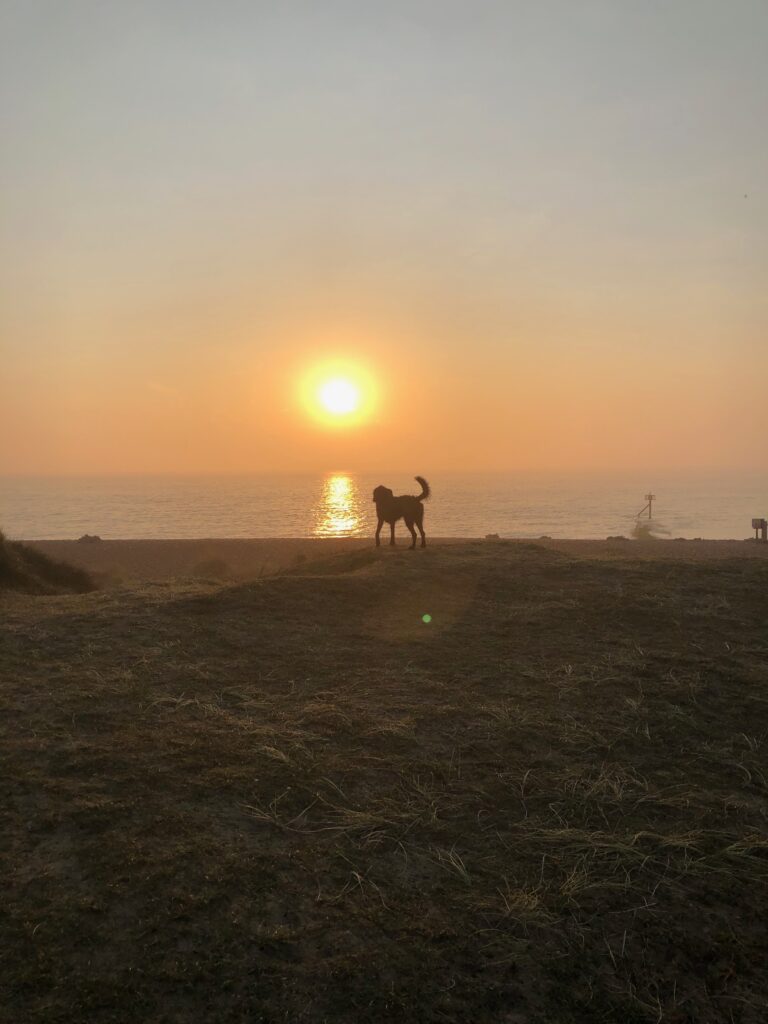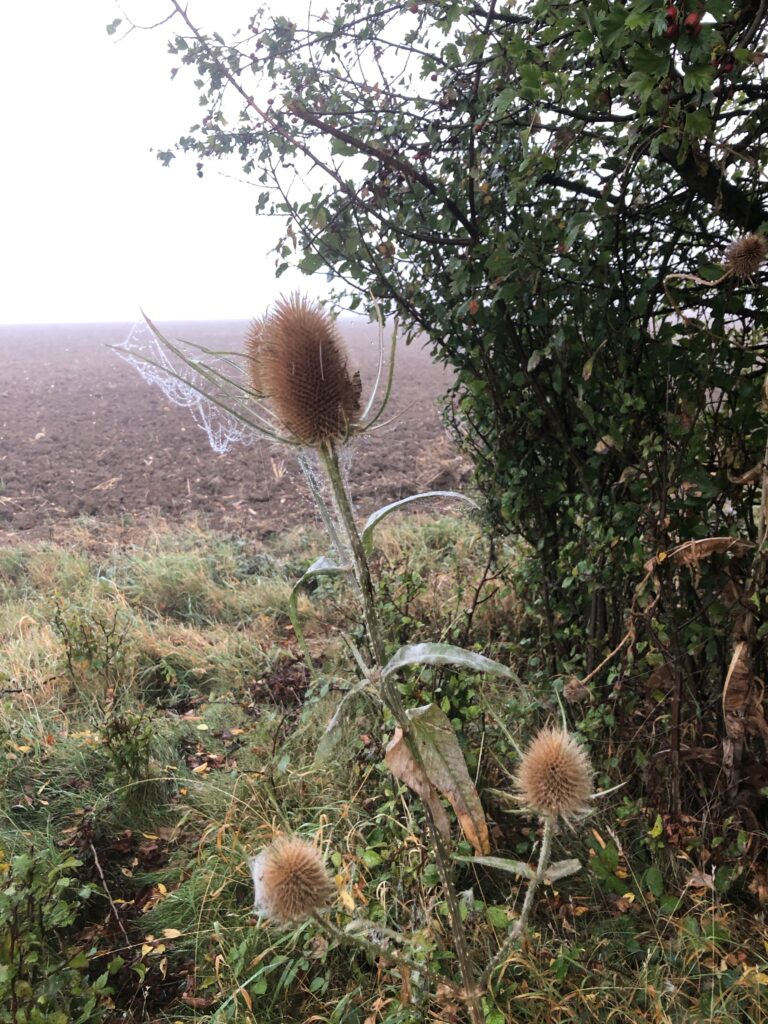
Michaelmas Day 2020
The raindrops roll relentlessly down my study window; it is raining so hard that the rods of water bounce off the ground; the cloud hangs low over the miserable fields.
Is it a feature of advancing age that my life is increasingly ruled by the weather? Its effects on both mind and body feel so dominant, more than merely that I live in a profoundly rural area where the seasons dictate work, and weather rules activity. It certainly forms the subject of this blog. Maybe one day some digital archivist will unearth it as proof of our changing climate.
We have had, give or take a few windy and rainy days, six months of summer. The constant rains of winter ceased a week or so before full lockdown began at the vernal equinox, and the good weather continued with meteorological precision till the day of the autumn equinox. It has been a blessing which has mitigated the effects of the restrictions imposed on us to limit the spread of Covid-19. Meetings have taken place out of doors; church services have been held with the doors wide open to air the interior; meals with friends could be eaten in the garden.
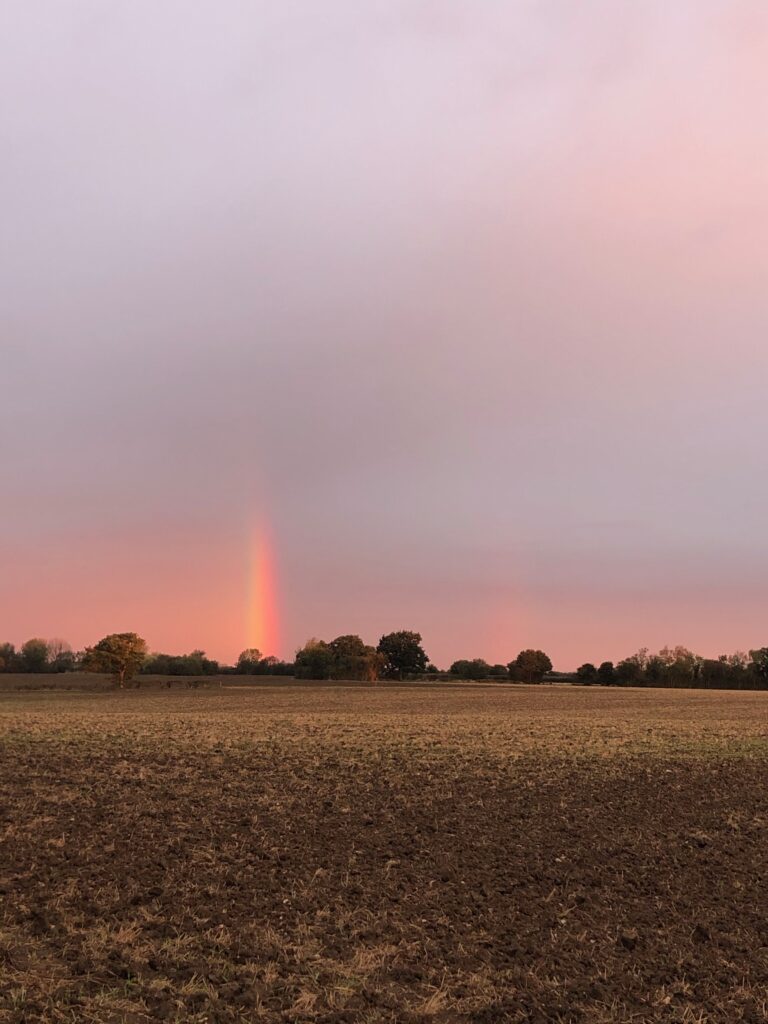
Everything now has changed. Here in the east bitter northerly gales swept down the coast to buffet us. Heavy rain such as we have not seen for half a year turned dust to mud within hours. It is cold. It is not, after all, that this is unexpected, but that the promise of winter arrives with the threat not only of wet and cold, but of more stringent regulations in the face of rapidly rising cases of the virus, more hospital admissions, and the beginning of an upturn in daily deaths.
The first three weeks of September were golden and warm, summer clinging on till the last moment with dreaming misty mornings and shimmering hot days. There is always a tinge of poignancy in the knowledge that these days are numbered, and for me a twinge of pain, for this perfect weather recalls that of another September, 34 years ago now, when our lives changed for ever.
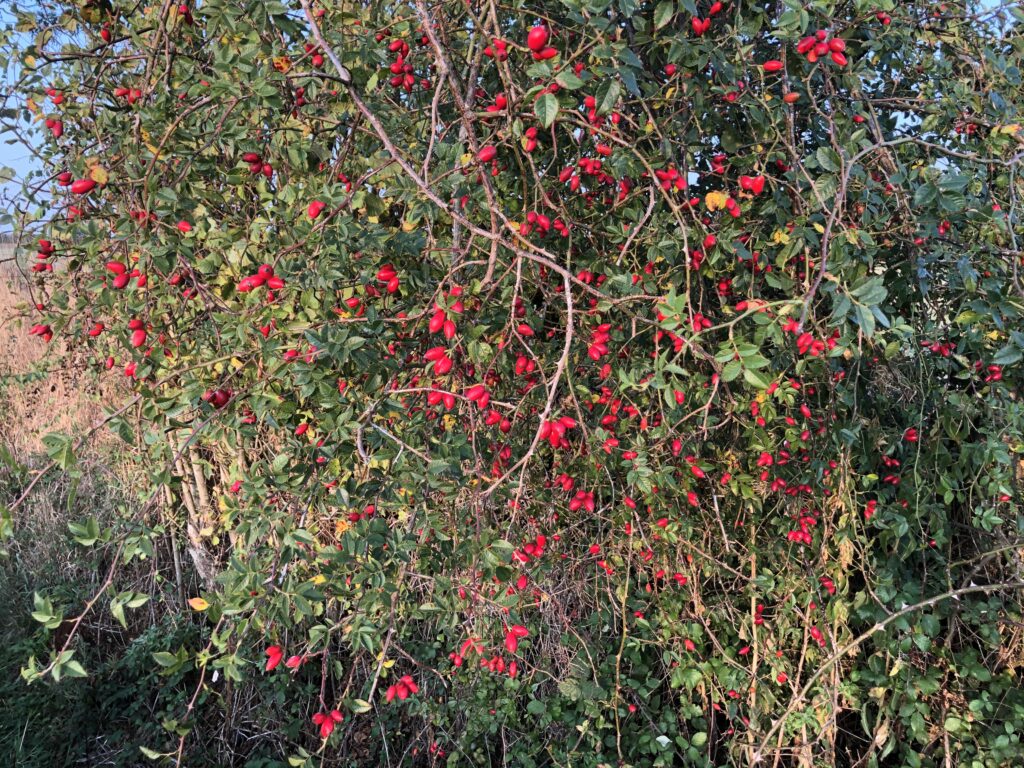
Mid-month the heat was building, and the dog and I went on what must surely be the last of our dawn excursions to see the sun rise over the sea. The regular reader will say there is nothing remarkable in that, but there was something that morning which took me beyond the usual joy in the loveliness of Suffolk shore and fields. As the sun rose through the mist I was conscious that I was in one of those liminal moments, a profoundly spiritual time, when darkness is vanquished by the light, and the animal world with its crepuscular creatures once again gives way to human noise and activity.
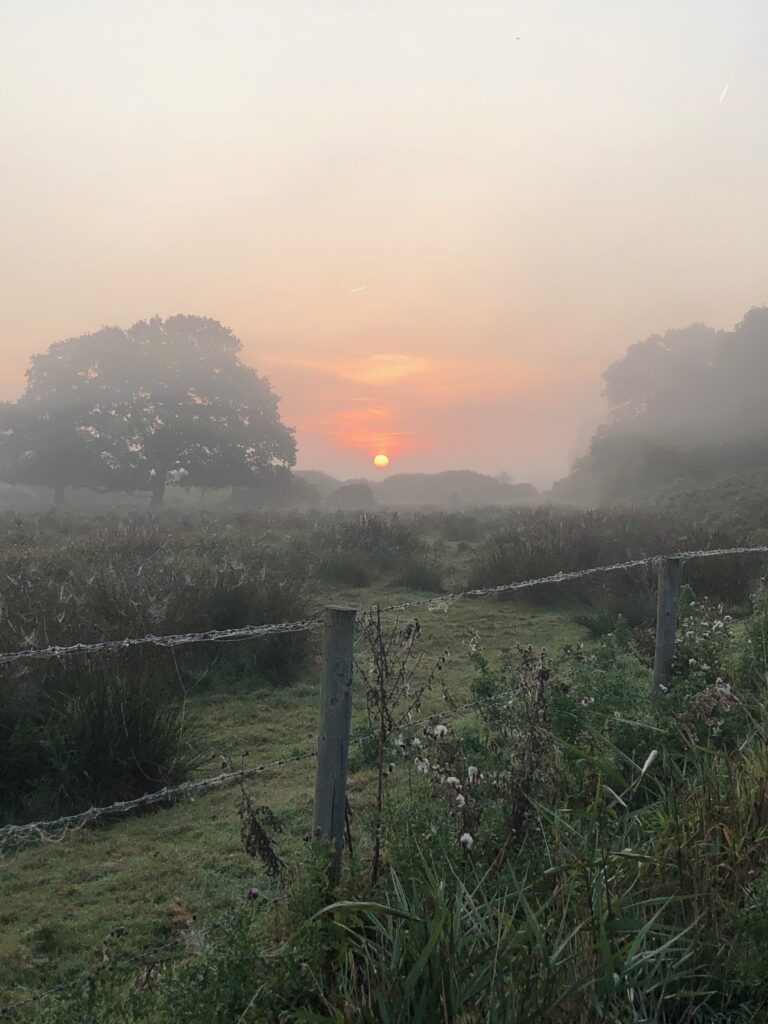
We walked through the dew towards the shore, along a path diamond-spangled with spider webs. Out of the brume an inquisitive calf loomed into view.
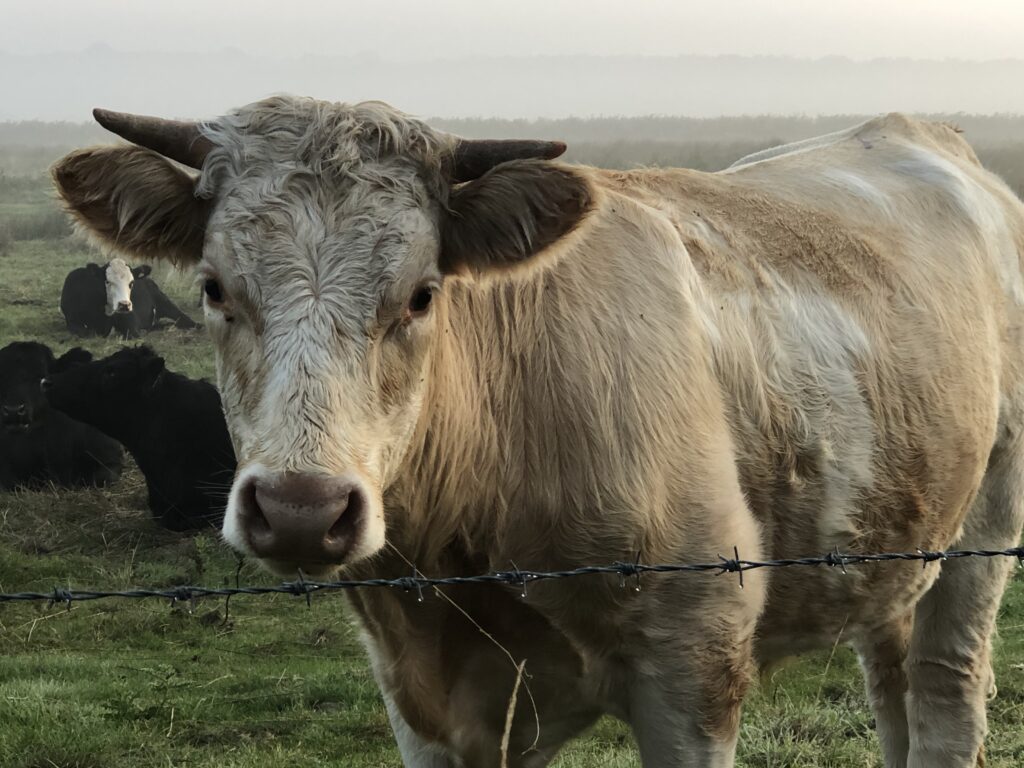
In places in the hollows cold and lingering wisps of mist wrapped their chill around us. A slight rise in the path and the air was suddenly warm, a memory of the heat of yesterday clinging to the banks.
With no warning sound there was a crashing through the trees to our right parallel to the path, and red deer – five, six, maybe even seven, galloped alongside for a while. And then – then – we stopped stock still in our tracks. In front of us for one fleeting moment was a stag. He paused, his noble head with its many branched antlers held high and still, and then he was gone, leaping over the undergrowth to re-join his hinds. It was over in a second – no time for the camera on my phone for I was restraining the dog. But the encounter somehow signified more than this thrilling glimpse of one of the largest land mammals in the UK. It was the meeting of two worlds at the secret time of dawn, a timeless moment of mystery, an outward and visible sign of a special grace – of having witnessed something beyond my world, gone in a heart beat, but imprinted for ever in my mind’s eye. I felt more moved than I can say, almost that I could happily cease then and there to live, so that nothing following could ever mar or taint the memory.
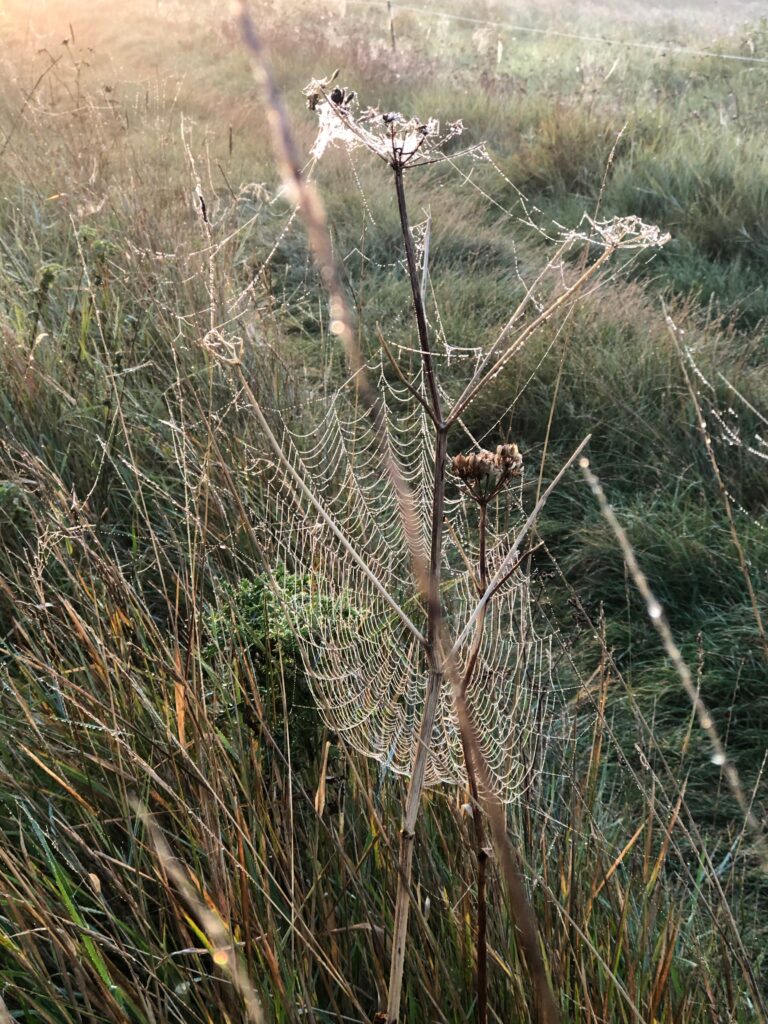
There is a passage in the childhood book “The Wind in the Willows” by Kenneth Grahame when the two animals, Rat and Mole, are searching through the night for a lost young otter. Rat hears the ‘Piper at the Gates of Dawn,’ and knows an intense longing which I think is akin to what I felt:
“It’s gone!” sighed the Rat, sinking back in his seat again. “So beautiful and strange and new! Since it was to end so soon, I almost wish I had never heard it. For it has roused a longing in me that is pain, and nothing seems worthwhile but just to hear that sound once more and go on listening to it for ever.”
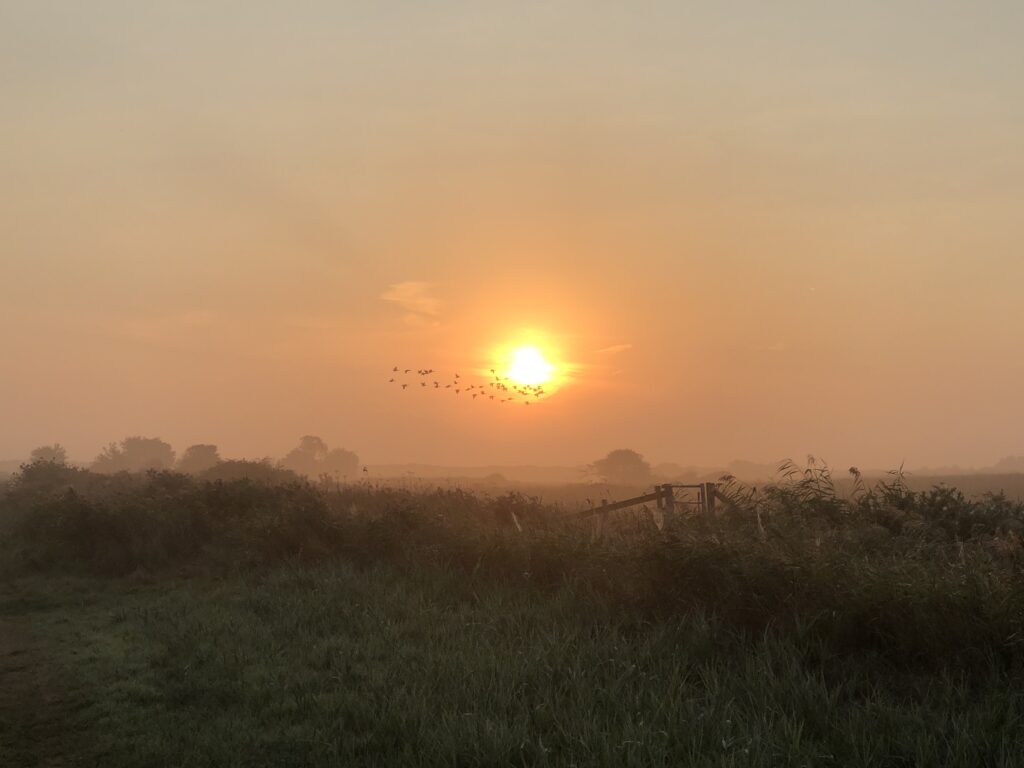
We continued into the rising sun, the sound of the sea gentle ahead of us. Across the dawn sky a skein of geese rose from the pools and flew south. And then we followed the shore north to the coastguards’ cottages, and back across the purple heath, and through woods of birch, pine and beech, dappled now by a radiant September sun. I have walked many thousands of miles through Europe – over mountain ranges, arid high plains, endless forests, battlefields of long ago, and gentle pastures – but somehow this walk will never be surpassed in memory.
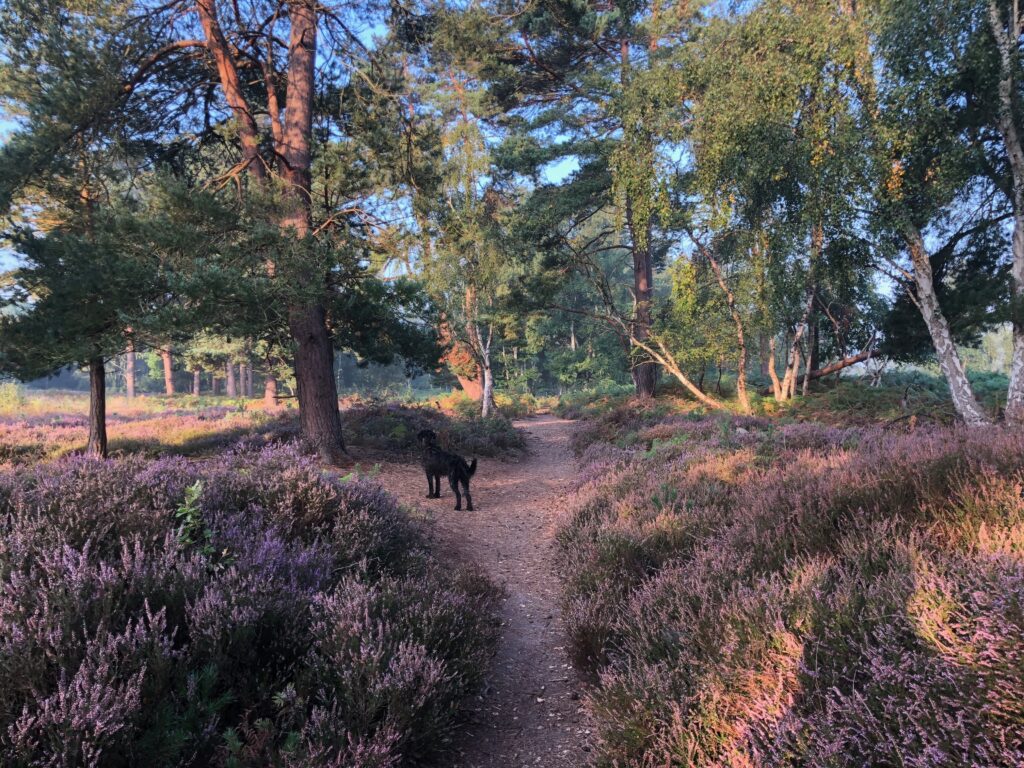
On either side of them, as they glided onwards, the rich meadow-grass seemed that morning of a freshness and a greenness unsurpassable. Never had they noticed the roses so vivid, the willow-herb so riotous, the meadow-sweet so odorous and pervading. Then the murmur of the approaching weir began to hold the air, and they felt a consciousness that they were nearing the end, whatever it might be, that surely awaited their expedition.
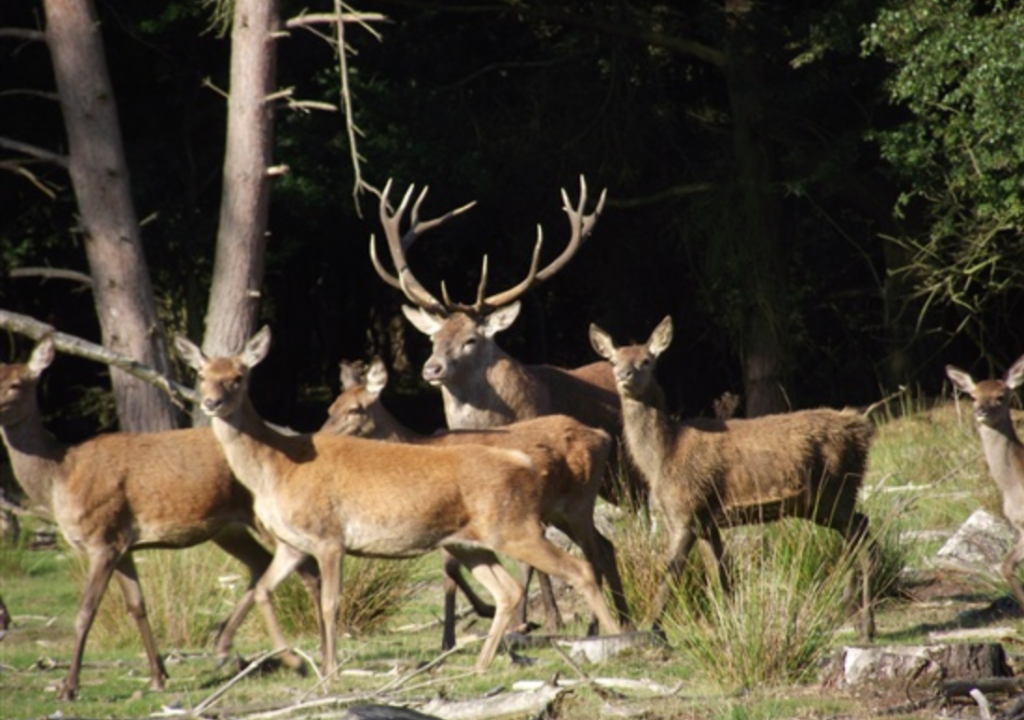
In case, reader, you are disputing that I saw red deer, I should note that the herd around RSPB Minsmere is the largest in the British Isles outside Scotland. The gentleman I saw will soon be fighting for his position, for in late September through October the stags return to Minsmere for the annual rut.
I have mentioned Minsmere and Dunwich frequently in these chronicles. Readers outside the area may be less aware than those who live nearby of the threat posed by the proposed construction of Sizewell C and D to the north of the ‘B’ power station, bordering the RSPB reserve, with a “campus” by the beautiful hamlet of Eastbridge. Posters from local opposition groups proclaim a threatened 600 lorries a day on our narrow roads and lanes.
More than 5600 different animals, plants and fungi have been recorded at Minsmere – more than on any other RSPB reserve and amongst the highest number of any nature reserve in the UK. Minsmere’s habitats include four of national conservation priority: reedbeds, lowland wet grassland, shingle vegetation and lowland heath. These habitats support a wide range of bird, plant and invertebrate populations of international conservation importance.
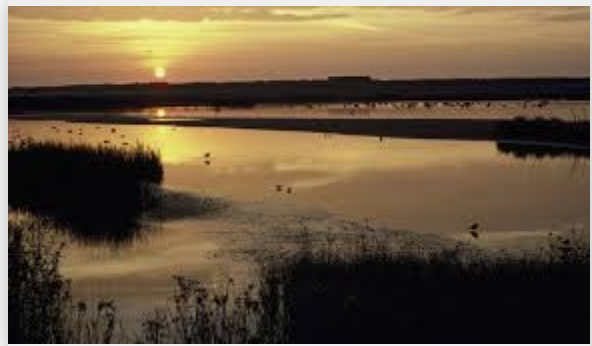
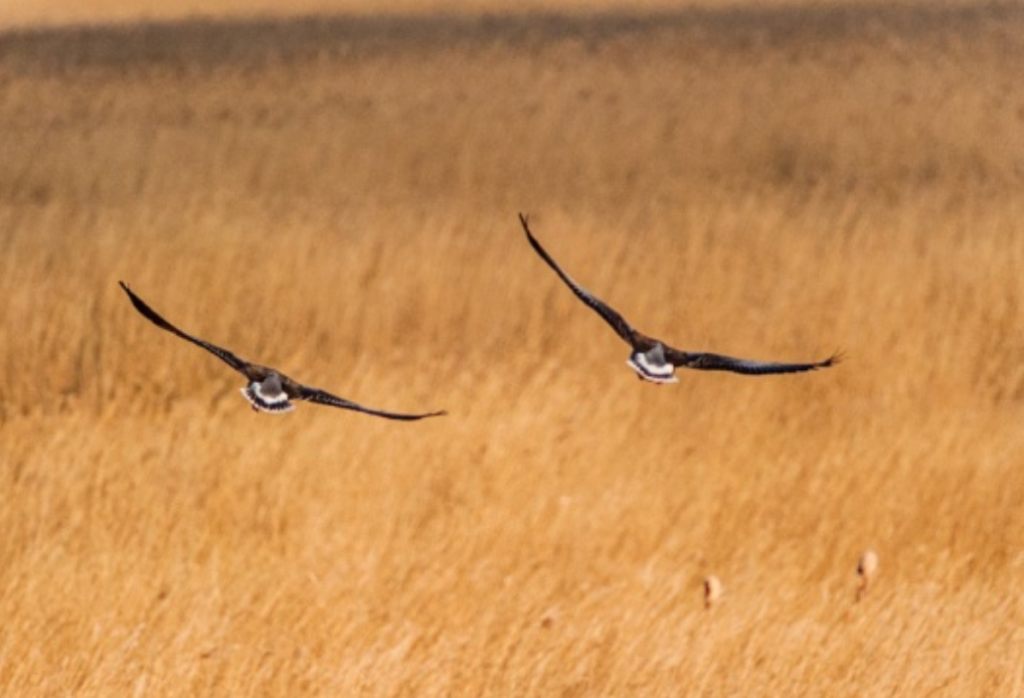
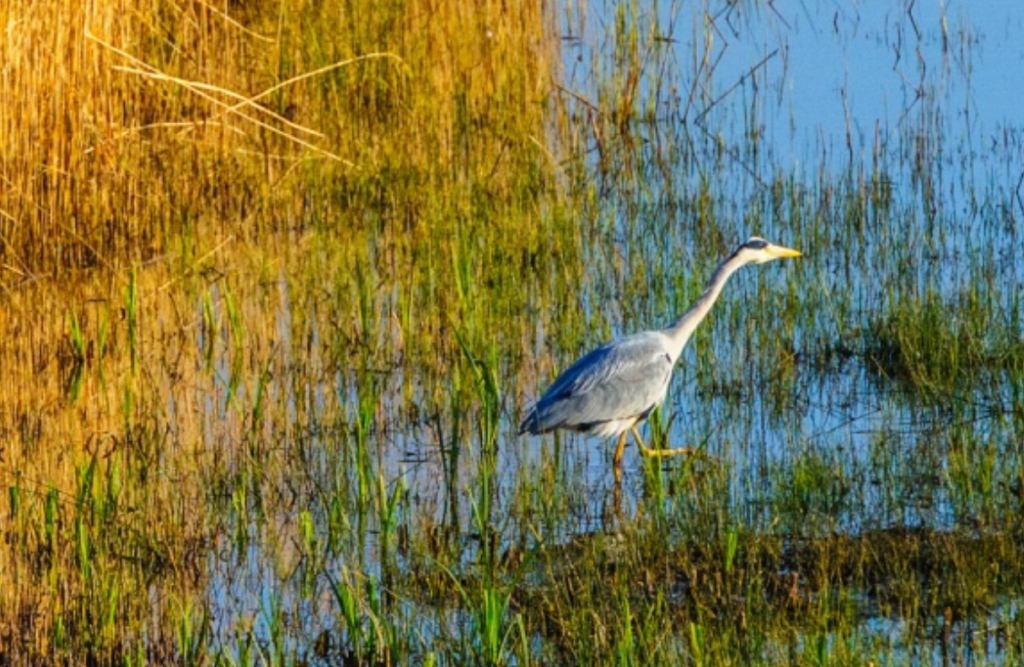
Photos: RSPB
Among the diverse wildlife are nationally important populations of bittern, marsh harrier and avocet. Other wildlife in the wetlands include otter, water vole, kingfisher, specialist wetland plants and many rare dragonflies and other invertebrates. Across the heathland there are many rare species making a home, including nightjar, woodlark, Dartford warbler, adder, natterjack toad and silver-studded blue butterflies.
As well as its importance to today’s wildlife, Minsmere has played a significant role in wildlife conservation throughout the years. The reserve was the springboard for the recovery of both bittern and marsh harrier in the UK and, alongside RSPB Havergate Island a few miles down the coast, Minsmere ensured the successful return of breeding avocet to the UK after an absence of more than 100 years.
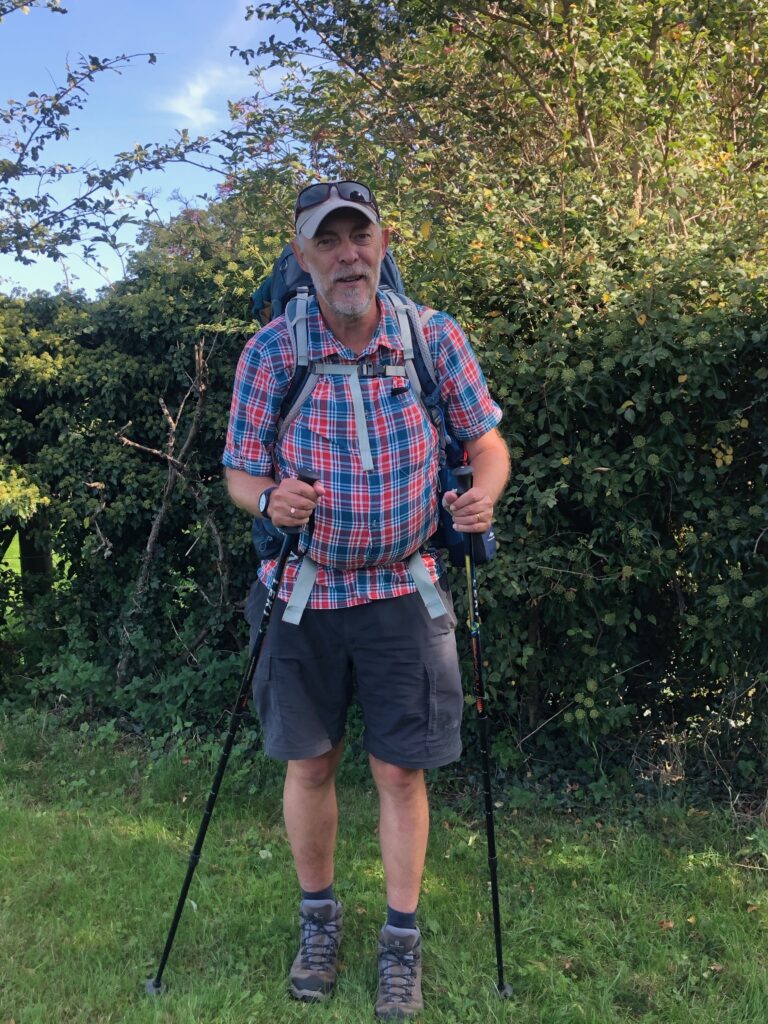
Unexpected meetings bring hope and pleasure. Online friendships can bring strangers together. I learned that a fellow pilgrim, who walked the Via Francigena from Canterbury to Rome two years after I did, and who is a member of the pilgrim organisation for which I work, was walking between East Anglian Cathedrals – Peterborough, Ely, Bury St Edmunds and Norwich. He must surely pass through Diss and onto the Boudicca Way? Yes, he would, and accordingly the dog and I walked a stretch with him one hot afternoon, through the gentle south Norfolk countryside, along lanes that time forgot, across meadows, over a gurgling stream, to little churches standing alone in their landscape. As pilgrims do, we had a lot to talk about.
Who could have thought, when I was young, that there could be virtual friendships? Virtual meetings and video conference calls? We used to joke as we answered our old-fashioned landline telephones, anchored as they were by a cord to the wall, that it was a good thing we couldn’t be seen the other end.
What else to say of September? We learn to live with uncertainty: everything changes and yet nothing does. Life goes on, but hedged around with questions – have I got my mask, my hand sanitiser, my vinyl gloves, with me? How many people can I meet at any one time? And where? Is the person behind me in the queue too close? Will we be locked down again? How will we get through a long winter without the comfort of friends and family?

The cycle of life in the country, the harvesting, the ploughing, the sowing, continues no matter what, and earths us, telling us – if we care to listen – that life goes on, and amid the pandemic gloom there will always be moments of transient grace – a bird that sings, a golden leaf that floats down in front of us, a noble stag at daybreak. I leave you with Sylvia Plath.
“Black Rook in Rainy Weather“
On the stiff twig up there
Hunches a wet black rook
Arranging and rearranging its feathers in the rain.
I do not expect miracle
Or an accident
To set the sight on fire
In my eye, nor seek
Any more in the desultory weather some design,
But let spotted leaves fall as they fall,
Without ceremony, or portent.
Although, I admit, I desire
Occasionally, some backtalk
From the mute sky, I can’t honestly complain:
A certain minor light may still
Leap incandescent
Out of the kitchen table or chair
As if a celestial burning took
Possession of the most obtuse objects now and then –
Otherwise inconsequent
By bestowing largesse, honour,
One might say love. At any rate, I now walk
Wary (for it could happen
Even in this dull, ruinous landscape); sceptical
Yet politic; ignorant
Of whatever angel may choose to flare
Suddenly at my elbow. I only know that a rook
Ordering its black feathers can so shine
As to seize my senses, haul
My eyelids up, and grant
A brief respite from fear
Of total neutrality. With luck,
Trekking stubborn through this season
Of fatigue, I shall
Patch together a content
Of sort. Miracles occur,
If you care to call those spasmodic
Tricks of radiance miracles. The wait’s begun again,
The long wait for the angel,
For that rare, random descent.
